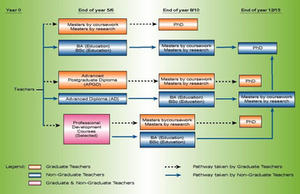Many of you are keen to upgrade yourselves but have little or no advanced certification to show for your efforts. And while many of the advanced certification programme courses are very useful, they are usually available only to programme candidates. If these situations sound familiar to you, fret not. From 2005, you can upgrade yourself and obtain advanced certification at the same time.
The Graduate Programmes and Research Office (GPR) at NIE has put in place the Professional Development Continuum Models (PDCM) to provide you with more options and different pathways to do both.
The new models cater to both graduate and non-graduate teachers who have completed their initial teacher training programmes.

Professional Development Continuum Models Chart
Graduate Teachers
Pathways available for graduate teachers are as follows:
- Attain a Master’s degree (by coursework or research) by the end of to 6 years, then proceed to complete a PhD by the end 8 to 10 years.
- Attain an Advanced Postgraduate Diploma (APGD) by end of year 5 to 6
- Attain a Master’s degree by the end of 8 to 10 years using Accreditation Core (AC)1 modules from the APGD for accreditation into the Master’s programme; then attain your PhD by the end of 12 to 15 years.
- Accumulate relevant AC modules offered as in-service courses and apply for accreditation of these modules into specific Master’s programmes. Each module has a lifespan of five years for accreditation. In such instances, completion of APGD is not necessary. However, accreditation to any Master’s programme is limited to a maximum of 12 Academic Units (AUs).
Non-graduate Teachers
Pathways available for non-graduate teachers are divided into two categories:
- Those who qualify for undergraduate degree programmes based on their GCE A- level/polytechnic Diploma or Diploma in Education (Dip Ed) results:
• Can attain their basic degree certification by end of year 5 or 6. They can then complete their Masters’ certification by year 8 to 10 and then to PhD degrees in 12 to 15 years after Dip Ed.
• Accumulate relevant AC modules offered as in-service courses and apply for accreditation2 of these modules into degree programme later on by merit of their own qualifications without the completion of Advanced Diploma. These AC modules have a lifespan of five years for accreditation to the degree programme. - Those who do not qualify for admission to the degree programmes can:
• Complete the Advanced Diploma (Adv Dip) certification by the end of year 5 or 6;
• Use the Adv Dip grades, together with the Dip Ed grades, to meet entry requirements into the degree programme.
• Upon admission to the degree programme, use relevant AC modules in the Adv Dip for some AUs in the degree programme. These AC modules have a lifespan of five years for accreditation to the degree programme. By end of year 8 to 10, these teachers can attain their basic degree certification; and by year 12 to 15, teachers can then work towards their Master’s certification.
What the New Models Mean for You
The new continuum models mean more flexibility and convenience for teachers. Enrol in programme courses as long as you meet the pre-requisite requirements (if any). Previously, teachers had to first enrol as programme participants.
- Gain academic units (AUs) upon successful completion of your enrolled courses. Once you have accumulated sufficient AUs, you can apply to NIE for relevant advanced certification. These modules have a lifespan of five years for accreditation to specific Adv Dip and APGD.
- Accumulate AUs from Accreditation Core (AC) modules to degree programmes without having to complete advanced programmes. [Note that these AC modules have a lifespan of five years for accreditation. The BA/BSc (Education) degree programme has a 50% cap on the total AUs that can be accredited from the Dip Ed, Adv Dip and any other relevant modules. The number of AUs that can be accredited to any Master’s programme cannot exceed 12.]
- Plan your learning journey more efficiently as NIE plans to offer modules for each advanced programme on a systematic two-year cycle.
NIE also plans to offer in-service training at school sites for busy teachers, where the facilities, resources and time permit. So if you have always wanted to obtain a higher certification, start checking out the GPR website.
For more information on PDCM, please contact visit the GPR website at https://www.nie.edu.sg/gprica/pdcm.htm. [Editor’s note: GPR is now the Office of Graduate Studies and Professional Learning: https://www.nie.edu.sg/office-graduate-studies-professional-learning]
Notes
- Accreditation Core (AC) modules let teachers accumulate academic units for accreditation into higher levels of certification (i.e., Bachelor’s and Master’s degrees) in NIE. These modules would also be available as stand-alone professional development modules if you do not wish to pursue advanced certification.
- The total number of academic units (AUs) from relevant AC modules (together with the AUs from the Dip Ed) and any other relevant modules for accreditation into the degree programme cannot exceed 50% of the total degree programme AUs requirements.
